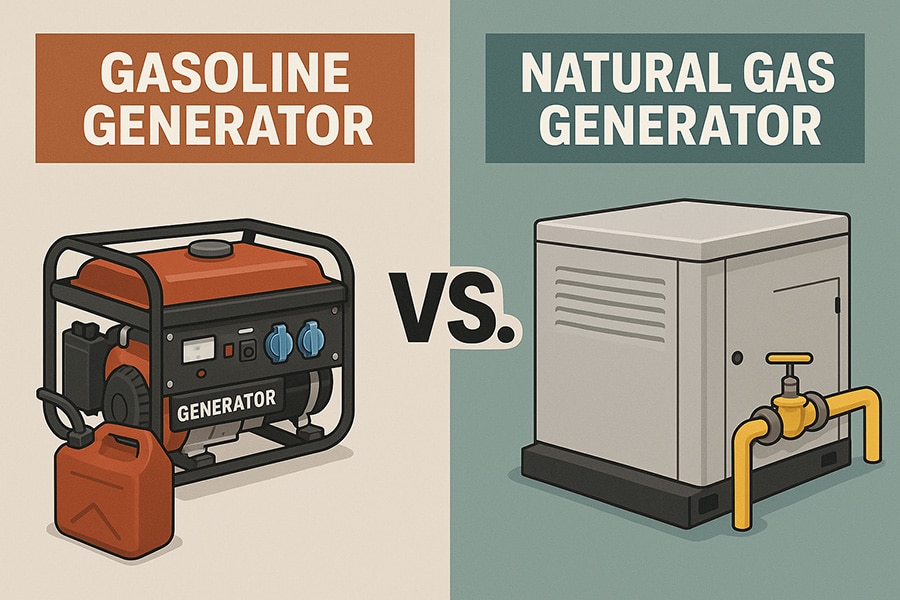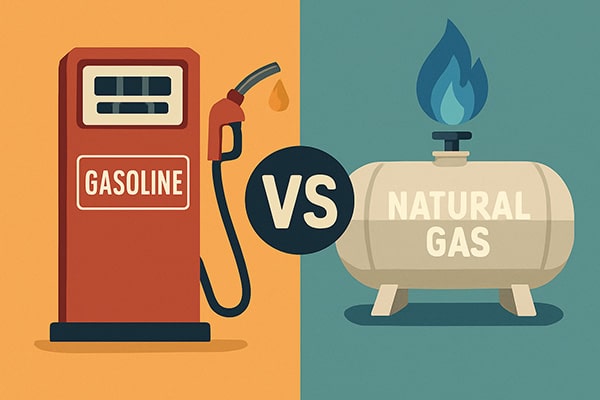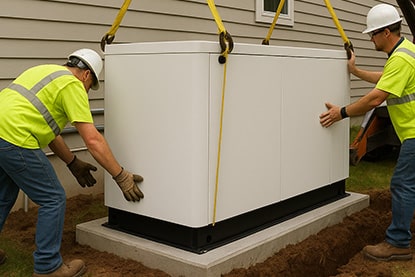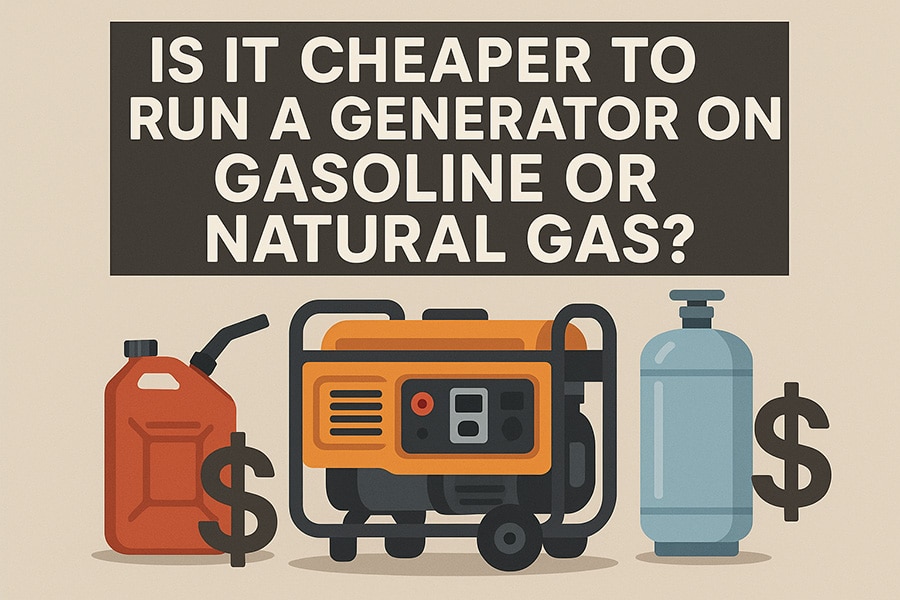Worried about high fuel costs for your generator? Choosing the wrong fuel can be a costly mistake. Let’s compare gasoline and natural gas to see which saves you more.
For long-term, high-load use where a pipeline is available, natural gas is significantly cheaper to run. Gasoline generators have lower upfront costs but higher fuel expenses over time. Your specific usage will determine the best economic choice for your business needs.

The fuel cost is just one part of the equation. To make the right call for your business, you need to look at the whole picture. I’ve spent decades in this industry, and I’ve seen clients make costly assumptions. Let’s dive deeper into the specifics so you can avoid them.
What is the cheapest fuel for a generator?
Searching for the absolute cheapest fuel for your generator? The options can seem overwhelming, leading to a poor investment. I’ll show you the most cost-effective fuel source right now.
Generally, natural gas is the cheapest fuel if you have access to a utility line. Propane is often the next cheapest, especially when bought in bulk. Gasoline is typically the most expensive fuel per hour of operation, followed closely by diesel for most consumer-grade generators.

The "cheapest" fuel isn’t just about the price per gallon or cubic foot. You have to consider availability and how efficiently the generator uses it. I’ve seen many clients focus only on the pump price and miss the bigger picture.
Fuel Cost & Efficiency Comparison
Let’s look at a typical cost comparison. Remember, these prices fluctuate, but the general relationship between them stays fairly consistent. For a business, calculating the cost per kilowatt-hour (kWh) is the most accurate way to compare. (Use Chinese data as a reference)
| Fuel Type | Average Cost | Runtime (per unit on 5kW load) | Key Consideration |
|---|---|---|---|
| Natural Gas | ~$0.10/kWh | Continuous | Requires pipeline access |
| Propane (LPG) | ~$0.15/kWh | 15-20 hours / 20lb tank | Easy to store, widely available |
| Gasoline | ~$0.30/kWh | 8-12 hours / 5 gallons/ 18L | Highly available, short shelf life |
| Diesel | ~$0.25/kWh | 12-16 hours / 5 gallons/ 18L | More efficient, higher initial cost |
Long-Term Value
For a purchasing manager or User, the total cost of ownership is what matters. Natural gas clearly wins for stationary, long-term use where a pipeline is available. For portable needs, the choice between gasoline and propane often depends on balancing convenience and upfront hardware cost with long-term running expenses.
What is the downside of a natural gas generator?
Natural gas generators look great on paper with their low fuel costs. But what’s the catch? Ignoring the downsides can lead to major installation issues and unexpected downtime later on.
The main downsides are its complete lack of portability, as it must be tied to a gas line. Installation is also more complex and expensive. Additionally, natural gas has a lower energy density than gasoline, meaning a generator will produce slightly less power running on it.

I’ve worked with many clients who were initially sold on natural gas until we discussed the practical realities. The biggest hurdle is always the infrastructure. You can’t just place a natural gas generator anywhere; it’s a permanent installation that requires planning and professional work.
Key Disadvantages Breakdown
A generator choice is a trade-off. While natural gas saves you money on fuel, it has significant upfront and logistical costs. Here’s a direct comparison against the more common gasoline model.
| Factor | Gasoline Generator | Natural Gas Generator |
|---|---|---|
| Portability | High (can be moved anywhere) | None (fixed to gas line) |
| Installation | Simple (place and run) | Complex (requires licensed plumber) |
| Upfront Cost | Lower | Higher |
| Power Output | Higher (per engine cc) | Lower (approx. 10%~20% less) |
When It’s a Deal-Breaker
The immobility is the biggest issue. If your business needs power at various job sites, a natural gas generator is simply not an option. Also, in a natural disaster like an earthquake that disrupts gas lines, your fuel supply is gone. This is a critical risk you must evaluate for your operational continuity plan. A gasoline generator, with stored fuel, can operate independently of the grid.
How much does it cost to run a natural gas generator for 24 hours?
Trying to budget for running a generator 24/7 during an outage? Guessing the cost can lead to nasty surprises on your utility bill. I’ll give you a clear way to calculate it.
A typical 7kW natural gas generator uses about 100 cubic feet of gas per hour at half load. With natural gas at $12 per 1,000 cubic feet, running it for 24 hours costs approximately $28.80. This is significantly less than gasoline.
Calculating this cost is crucial for your financial planning. I always advise my clients to run the numbers before they commit to a particular model. It’s not complicated once you know the variables, and it prevents major budget overruns during extended use.
The Calculation Explained
The formula is straightforward: (Generator Fuel Consumption in cubic feet/hr) x (Hours of Operation) x (Cost per cubic foot). I recommend using the Rated load figure for general estimates as it provides a realistic average.
Cost Examples at 50% Load
Let’s use a common rate of $12 per 1,000 cubic feet (MCF), which is $0.012 per cubic foot, to see how it plays out for different sizes over a full day.
| Generator Size | Approx. Fuel Use (CFH @ 100% Load) | Estimated 24-Hour Cost |
|---|---|---|
| 7 kW | 100 CFH | $28.80 |
| 15 kW | 200 CFH | $57.60 |
| 22 kW | 290 CFH | $83.52 |
This cost stability is why natural gas is so attractive for businesses that need reliable, long-term backup power. The higher upfront investment often pays for itself in fuel savings within the first few major outages.
Conclusion
In summary, for long-term, stationary use, natural gas is cheaper. For portability and lower initial cost, gasoline is the practical choice. Evaluate your specific needs to decide correctly.

